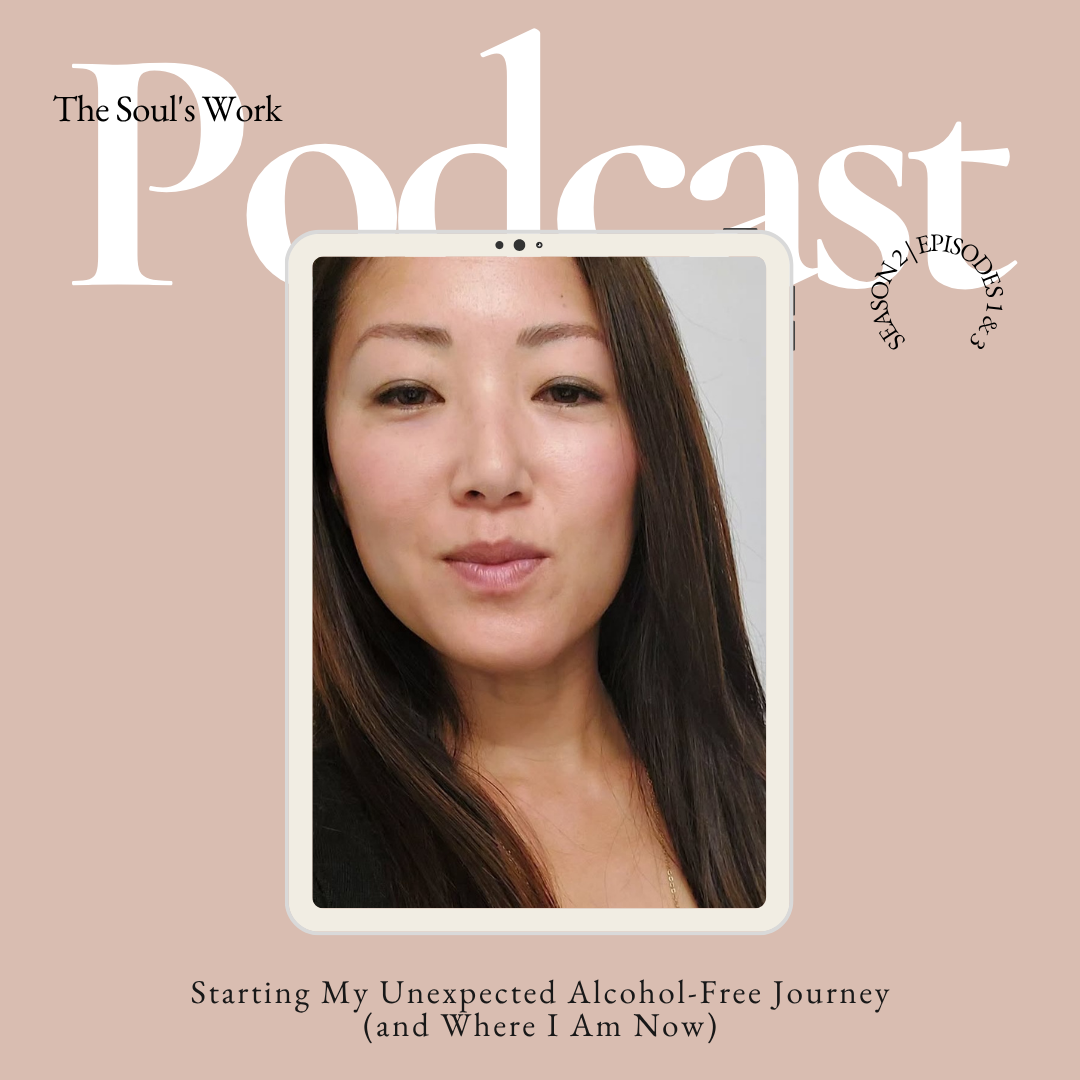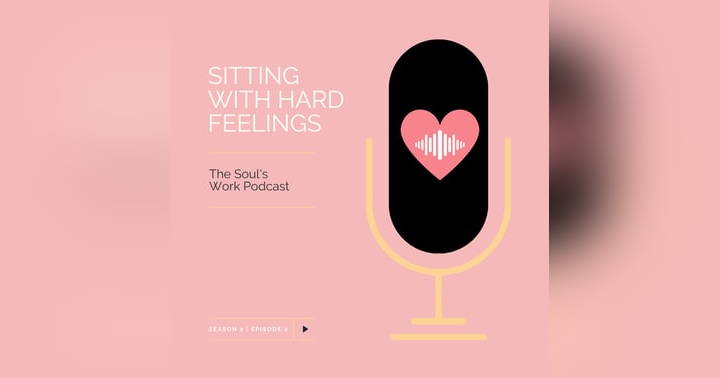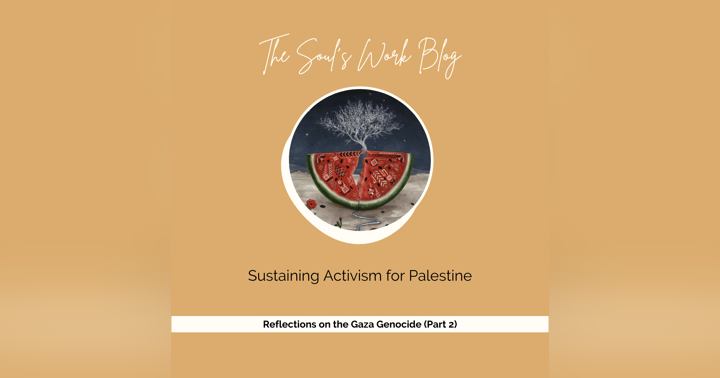S2 | EP1 & 3: Starting My Unexpected Alcohol-Free Journey (and Where I Am Now)

In 2022, I took a trip back in time to the birth of The Soul's Work Podcast. My intention was to listen to all of my Season 1 episodes to see if any of my perspectives had changed four years later.
Ultimately, I decided to archive most of those episodes and post my written reflections on them – which you can read starting here: "S1 | EP1: The Birth of The Soul's Work Podcast."
Now, in 2025, I'm ready to do the same for Season 2, which launched five-and-a-half years ago (in May 2020). Some of those episodes will stay published, while others will get archived.
Removing episodes isn't a decision I take lightly, and once upon a time I thought I never would as a way of preserving my journey as is. But for various reasons, I no longer feel that desire or self-pressure to do so.
I'm glad to have these blog post reflections to capture the important parts of any episodes I remove from the podcast. And I also trust that any archived content I want to share in more detail will get integrated into future episodes.
All right, here we go ...
* * *
This is my five-years-later take on Season 2, Episode 1 (which I've archived) and Episode 3 (listen here). I'm combining these episodes because they were both about the start of my journey going alcohol free.
Episode 1 was a short introduction to Season 2. In it, I shared that I had ended my first season feeling like I needed to go do the work versus share about the work. I had started deep-diving into a lot of tough, oftentimes painful inner work. It was also when I started working with an incredible trauma therapist and experienced a ton of growth.
Almost two years later, I felt ready to share about some of the life-changing things I had experienced. It was also the start of the COVID-19 pandemic and, unexpectedly, the beginning of my path to becoming alcohol free.
In Episode 1, I shared about my journey with drinking: In my late teens to my mid-20s, I had become quite dependent on alcohol – including going through the addiction cycle of building tolerance, experiencing cravings, and suffering from withdrawal.
At the time, I knew I couldn't fully control my drinking and wished I could stop, but it had become my go-to protective response to deal with the stress and pain I often felt.
In my mid-20s, many things in my life started turning around, including drinking less. On the surface, my drinking seemed less problematic. But I would still time and time again find myself caving in to the usual triggers that brought up an overwhelming urge to drink, or not being able to stop at one drink when I said I would. At the start of the pandemic, I struggled with maintaining my willpower to not give in.
"Even more recently, I’ve had to avoid watching certain shows on TV where I know the characters are always drinking wine or scotch ... because I’m afraid it will trigger me to want to drink."
One night, in April 2020, I was overcome with anxiety, stress and loneliness from my work situation and the uncertainty and isolation of lockdown. To cope, I drank and drank until 2 in the morning, crying on the phone with a friend. The next day, I woke up knowing I needed to take a moment to really understand my current relationship with alcohol.
Shortly thereafter, I decided to take a pause with my drinking. I knew it would backfire to say that I'd never drink again (lord knows how many times I had said that and failed). But maybe I could slow down enough to reflect and learn so that if I were to have a next drink, it would be coming from a more intentional place.
* * *
In Episode 3, called "Why It’s So Hard to Stop Drinking," I shared that I was 31 days alcohol free. It felt like such a huge accomplishment at the time, and gave me hope that maybe it was possible to keep going on my path to get free from that dependency.
I feel a lot of awe for the me back then, hearing myself earnestly and humbly going down this unknown road I knew could end in disappointment.
"From what I understand, it'll take probably at least 6 to 12 months without drinking alcohol for the brain to normalize and detoxify. And I don't know if that means it will look the way that it did before drinking ever occurred in my life.
But even if it doesn't, even if it repairs itself some percentage of the way, I feel like that in itself is enough to fight for and to push on with this. Because I don't want to be trapped in that cycle – I don't. And I want to be able to experience genuine joy more often, because that's honestly not something I've experienced very much of in my life."
In that episode, I shared what I'd learned about the neuroscience of addiction and why it truly is so challenging to escape that vicious cycle of dependency – very fascinating stuff!
I've written about what other supports helped me stay the course in this post: "S1 | EP11: Getting to Two Years Alcohol Free." In short, it was a holistic process that included learning the education, challenging my subconscious beliefs about alcohol, continuing the deep trauma-healing work, connecting with a supportive community, and so on.
In Episode 3, I shared that I wanted to take responsibility for my drinking because I know being in that cycle of addiction can harm ourselves and others. But what I could have hammered home more was that our so-called leaders must do better to create the environmental conditions and social supports that would make people less likely to resort to abusing substances, or other addictive behaviors, to cope with their trauma – or better yet, would make the trauma less likely to happen in the first place. And that includes the ongoing trauma of living life under racial capitalism.
As a previous researcher in the criminal justice field, I feel this has been studied to death already. We know what the root causes are. We know what people need to be well. What's lacking is the action to make real change happen.
I also want to emphasize that if it wasn't for the pandemic – specifically, the lockdown – I doubt I'd have started this journey when I did, or I wouldn't have made it very far.
"I think if our social lives were status quo when I returned to Canada, it would have been really difficult for me to not give into my triggers and cravings and be alcohol free for more than a few days at a time.
... Because I'm in this very controlled environment by myself and holed up in this condo apartment, immersing myself in the education, I feel that’s been helpful to get to day 31."
I'm not saying I'm glad for the pandemic – it was so deadly and horrible for many, and it definitely exacerbated some people's addictions. But I am saying that the conditions the lockdown created for me illuminated how much drinking culture is woven into "normal life" here.
I think it should give one pause to know that for me to get to one month without drinking, what had to be in place was me being as far removed as possible from socializing with my friends in the city, banning myself from watching certain TV shows, and reporting certain ads on social media so that I wouldn't keep seeing them (namely, the ones about delivering alcohol during the lockdown).
I definitely used to be part of glorifying drinking culture. Now, while I can still appreciate why someone might enjoy a drink, I'm more careful with how I contribute to it.
* * *
Today, I am five-and-a-half years alcohol free.
I feel grateful and proud of myself for getting here. Once I hit the point where I lost the cravings for alcohol, it was mostly a smooth ride where I didn't have to wrestle with my willpower to not have a drink.
But, to be honest, several months ago, when I was drowning in a very toxic work environment and feeling all the things about the genocide in Gaza, the cravings started creeping back in.
It was a huge red flag that I needed to quit that job – and I did, but I rode some rocky waves for a little while debating if I should just escape life momentarily, like I had always done before with drinking. It'd be understandable, I thought (and still think), in these very dark times.
Ultimately though, I didn't do it. I feel relieved to be back in a more level place with being alcohol free, although I don't think I'd judge myself too hard if I had gone the other way.
Looking back at these five-and-a-half years, I feel immensely thankful knowing that letting go of my biggest coping mechanism has meant having the chance to live life more fully.
That's included being with the uncomfortable feelings I used to get too overwhelmed by and numbed with drinking. Learning how to stay with those feelings has meant more easily noticing when my boundaries are being crossed, cultivating a deep relationship with life-affirming grief, and reaching out to loved ones when I'm feeling hopelessness.
It's also involved building relationships and intimacy with others more genuinely. I can be more present for pleasurable moments – and actually remember them the next day. And I've been able to sink into joy much more often.
This is just my one journey with drinking and being alcohol free. Each person's is unique. And it's not the end of the story. But for now, I acknowledge where I've landed and feel at peace with it.
Janice xo
P.S. Listen to Season 2, Episode 3: Why It’s So Hard to Stop Drinking here.


